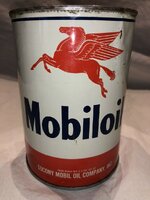53 was the last year that the 235 ever had the dipper style rods. If your engine is an honest all 54 motor, then it's for sure got pressurized con rods.
My dad's 53 pickup had splash lube bearings and even when the motor was relatively fresh it had a lot lower oil pressure than SubZero350 mentioned.
Personally, I've got a 51 1.5 ton with a 55 235 in it. I don't put a lot of miles on it, but its been happy wth conventional 10w-30. Modern detergent oils don't magically break off big chunks of sludge. They mainly just keep particles in suspension and prevent them from adhering to surfaces in the engine.
My dad's 53 pickup had splash lube bearings and even when the motor was relatively fresh it had a lot lower oil pressure than SubZero350 mentioned.
Personally, I've got a 51 1.5 ton with a 55 235 in it. I don't put a lot of miles on it, but its been happy wth conventional 10w-30. Modern detergent oils don't magically break off big chunks of sludge. They mainly just keep particles in suspension and prevent them from adhering to surfaces in the engine.


